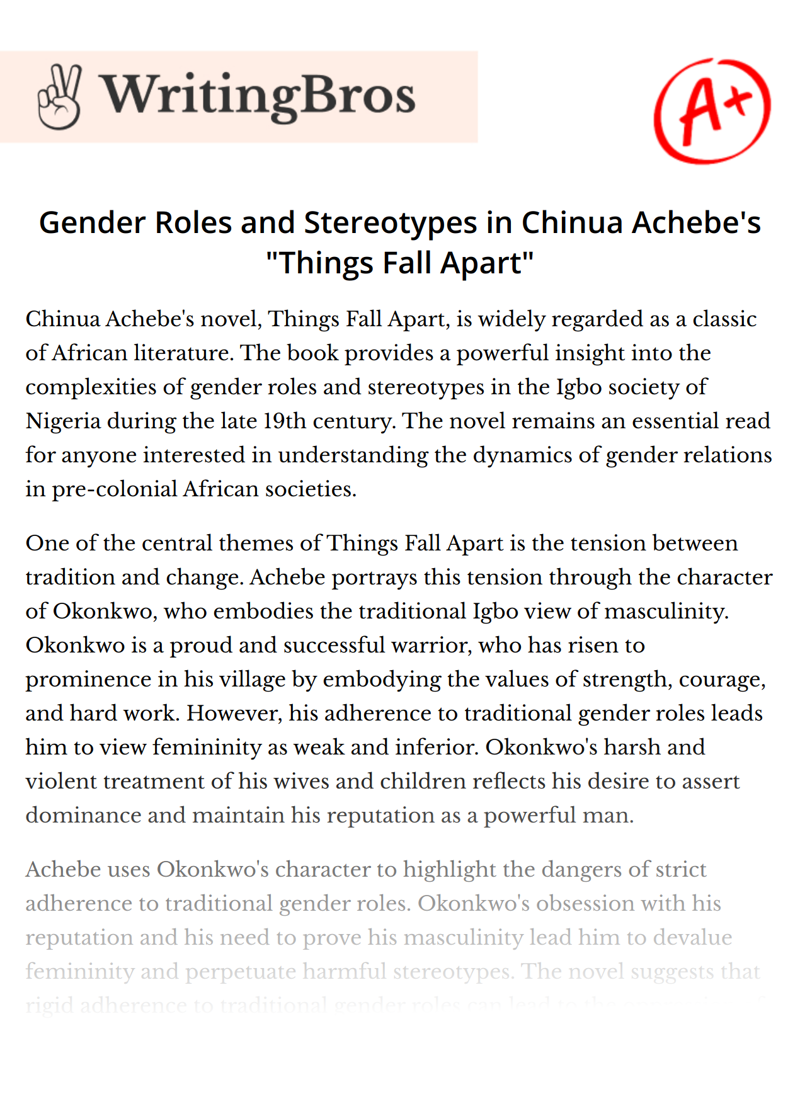Gender Roles and Stereotypes in Chinua Achebe's "Things Fall Apart"

Chinua Achebe's novel, Things Fall Apart, is widely regarded as a classic of African literature. The book provides a powerful insight into the complexities of gender roles and stereotypes in the Igbo society of Nigeria during the late 19th century. The novel remains an essential read for anyone interested in understanding the dynamics of gender relations in pre-colonial African societies.
One of the central themes of Things Fall Apart is the tension between tradition and change. Achebe portrays this tension through the character of Okonkwo, who embodies the traditional Igbo view of masculinity. Okonkwo is a proud and successful warrior, who has risen to prominence in his village by embodying the values of strength, courage, and hard work. However, his adherence to traditional gender roles leads him to view femininity as weak and inferior. Okonkwo's harsh and violent treatment of his wives and children reflects his desire to assert dominance and maintain his reputation as a powerful man.
Achebe uses Okonkwo's character to highlight the dangers of strict adherence to traditional gender roles. Okonkwo's obsession with his reputation and his need to prove his masculinity lead him to devalue femininity and perpetuate harmful stereotypes. The novel suggests that rigid adherence to traditional gender roles can lead to the oppression of women and the perpetuation of harmful stereotypes.
The portrayal of women in the novel also highlights the limitations and constraints placed on them in Igbo society. Women are expected to be subservient to men, to serve their husbands and families, and to play a secondary role in public life. Despite this, Achebe also portrays the strength and resilience of women in the face of these limitations. The character of Ezinma, Okonkwo's daughter, challenges her father's expectations of her and asserts her own agency throughout the novel.
Achebe's critique of gender roles and stereotypes extends beyond the Igbo society depicted in the novel to broader issues of colonialism and cultural imperialism. The arrival of the Europeans marks a turning point in the traditional gender roles of the community, as they bring with them their own ideas about gender. Achebe shows how the imposition of Western gender norms and stereotypes can be just as damaging as the perpetuation of traditional ones, resulting in the oppression and marginalization of certain groups.
The novel illustrates the need for societies to critically examine their own gender roles and stereotypes and to resist the imposition of outside ideas. Achebe emphasizes the importance of valuing the strengths and contributions of both men and women in society, rather than adhering to rigid gender norms and stereotypes. By doing so, he promotes gender equality and challenges harmful stereotypes that limit the potential of individuals and societies.
In conclusion, Things Fall Apart is a thought-provoking novel that provides a powerful critique of gender roles and stereotypes in the Igbo society of Nigeria during the late 19th century. Achebe's portrayal of male and female characters challenges traditional gender norms and highlights the limitations and constraints placed on women in the society. He also illustrates the dangers of imposing Western gender norms and stereotypes on non-Western societies. Ultimately, Achebe advocates for societies to critically examine their own gender roles and to value the strengths and contributions of both men and women. The novel remains a powerful and timely reminder of the importance of gender equality and the need to challenge harmful stereotypes that limit individual and societal potential.
Cite this Essay
To export a reference to this article please select a referencing style below

